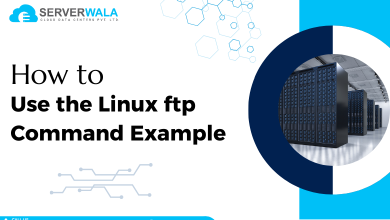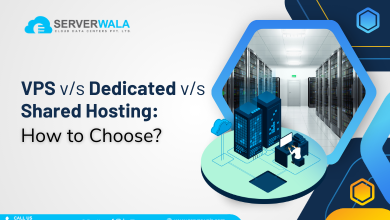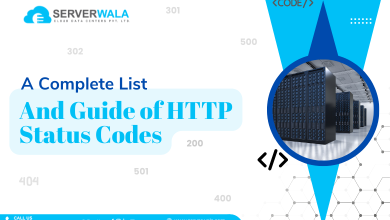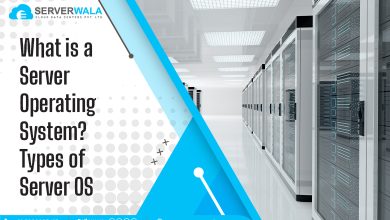VPS vs VPN: What’s the difference?

VPS and VPN, both these acronyms sound very similar and can be often very confusing. However, both are very different from each other. So, in this article, we compare VPS vs VPN in-depth, so you won’t get confused anymore.
With VPN software you can protect your data by hiding your IP address, encrypting it, and directing it through secure networks to remote servers located in other countries or states. In this way, your identity online is masked, enabling you to browse anonymously. People often think of what you can do with a VPN as something too high-tech to be useful to the average user, and they don’t understand why they should use it. Despite this, VPNs can be beneficial to both large businesses and individuals. VPNs can make using public WiFi, sending sensitive information, and even browsing Netflix entertainment options more secure.
Whereas VPS refers to a Virtual Private Server, it is a type of web server where a physical server is divided into multiple virtual servers having their independent resources.
It is important to know about the difference between VPS and VPN. Both have the word “virtual” but have little in common.
VPS vs VPN: Tabular Comparison
Below we have Compared VPS vs VPN in tabular format. Here you can easily understand the differences between VPS and VPS.
| Basis | VPS | VPN |
| Definition | A VPS is a server solution that is available on a physical server through virtual separation. | VPN, as the name suggests, is a highly private network due to deeper encryptions. |
| Common users | Companies, website owners, tech developers, etc, who want a similar service like a dedicated server at affordable pricing. | Organizations and individuals who require end-to-end data privacy. |
| Mode of service | A VPS is purchased as a plan from a hosting provider. | A VPN is generally a subscription-based service. |
| Hardware requirement | A VPS solution works on a physical server and uses the resources of the main server under a separate arrangement. | To set up a VPN, you need to configure the server and client sides. The server’s setup includes choosing how to encrypt data, verifying the user’s identity, and deciding who gets access. |
What is a VPS?
A VPS, or virtual private server, is a great alternative to a dedicated server because it provides a dedicated set of resources without the need for a physical machine. Essentially, a VPS is a virtually separate space on a powerful computer that is created within a physical server. This server type allows the client to acquire resources through private spacing on the main server, giving you the benefits of a dedicated server at a fraction of the cost. Overall, a VPS is a highly secured and powerful server solution.
How Does a VPS Work?
A type of specialized software called a hypervisor or virtualization software, is installed on a physical server. This software creates separate virtual environments known as virtual machines (VMs) or VPS instances. The hypervisor divides the physical server’s resources among different VPS instances. Each VPS is assigned a specific amount of CPU, RAM, and storage. This helps ensure that each instance has the resources it needs to function properly.
Also Read: VPS vs Dedicated: Which Hosting Plan is best for you?
What is a VPS used for?

The useful aspects of a VPS include hosting websites, running applications, or even as a remote workspace. VPS provides users with their own allocated resources, such as RAM, CPU, and storage, which they can use as per their requirements. It’s like having your little piece of the internet, where you can do your own thing without worrying about sharing resources with others, just like you have your room in a shared house. With VPS, you can install the software of your choice, configure the server settings to your liking, and have complete control over your environment. Additionally, VPS allows you to easily scale your resources up or down as per your needs, making it a flexible and customizable solution.
Also Read: What are the Advantages of Using VPS Hosting?
What is a VPN?
A VPN is a private network that protects data from cyber threats. In today’s world, it’s crucial to safeguard valuable data from hackers and attackers. A VPN achieves this by encrypting the data, making it difficult to decode. Data traveling through a VPN is hidden from cybercriminals, ensuring its safety. Increasingly, people are using VPNs (virtual private networks) due to growing online insecurity. VPNs not only increase online security, but they also offer many unexpected benefits. What you can do with a VPN is described here, along with the benefits of using it.
Benefits of Using VPN

We’ve covered the basics. A VPN may be right for you, and here’s why.
Wi-Fi security in public places
It is convenient to use public Wi-Fi, but it poses a security risk. Your online activity at the airport or while answering emails at a coffee shop may be tracked.
If you use a VPN while on another network, you can keep track of your browsing history, banking information, account passwords, and other personal information.
How Your Internet Service Provider Protects Your Data
The threat of being attacked by strangers on a public Wi-Fi connection is higher than on your home network. Still, your data is vulnerable.
You pay a monthly fee to your internet service provider (Comcast, Spectrum, Verizon, etc.) for access to all your internet data. Your internet service provider may keep track of your browsing habits.
While you may be using a “private” browsing function, this information can still be collected and sold to advertisers, and it can be hazardous if it falls into the wrong hands. You can hide your IP address by using a VPN. Knowing the difference between VPS vs VPN is essential for proper understanding and use.
Apps and services that collect data about you
There are other possible liabilities that you have brought into your own home besides your ISP. Several of the most popular apps and internet services-including Facebook-have been criticized for their privacy practices.
A VPN will prevent your IP address from being linked to your online behavior. Your location and browsing history will also be restricted.
Your government’s privacy policies
The information has nevertheless found its way into governments’ hands-even in the United States-despite many ISPs, apps, and internet data hubs saying they don’t sell browsing data.
Since Edward Snowden revealed in 2013 that Verizon was selling customers’ internet and phone data to the NSA, many Americans have become more aware of the many ways in which the government collects and uses their data. Several laws were passed following the Snowden leaks in response to public outrage.
According to the New York Times, the Defense Intelligence Agency paid a third-party data broker for the same data that the D.I.A. had previously been compelled from phone companies, bypassing a law requiring warrants.
You would be wise to invest in a VPN if you are concerned about governmental overreach.
Anywhere, Anytime Content Access
Hulu might frown upon using a VPN to catch the latest Criminal Minds episode in a country with inaccessible content, but it’s not illegal (in the U.S. and in many other countries) and it provides an effective way around content restrictions.
You seem to be browsing from another location when using a VPN. Therefore, if your local network doesn’t carry Criminal Minds, you can still watch the show.
Remote working security
Data encryption is one of the benefits of a VPN. It is possible to protect confidential information by coding data in a way that obscures its meaning.
If your company invests in a VPN, you will be able to connect workers to the office network and enable them to access sensitive documents while they are away from the office. Even after the pandemic is over, remote work is likely to continue, so a VPN can keep confidential data safe.
User-friendly
People who are technologically averse find some security measures and processes too time-consuming, even though we’d all like a little more security. With VPNs, you can add more security with little effort. Several providers provide intuitive and easy-to-use interfaces that are accessible even to non-techies.
Compatible with a variety of smart devices
In addition to protecting smartphones, tablets, and desktop computers, some VPN services can also protect company-loaned laptops. There may be slight differences in the protection plans and the abilities of each VPN company to protect different devices, but many VPN providers offer plans to keep you secure on multiple devices.
Smart savings
By spoofing your location using a VPN, you can save money if you do a little research. There are a lot of businesses that offer the same amenities for different prices, such as subscription services and airlines. When you change the appearance of your location in a way that offers cheaper services, you can end up saving a lot of money.
A VPN (virtual private network) has never been as important as now that millions of people are working from home because of Covid-19. Using this app, hackers cannot access your IP address or read any sensitive information that you send or receive. It protects your IP address from being hacked and encrypts your data.
In this age of government surveillance and invasion of privacy, a VPN is a must if you wish to browse the web anonymously.
VPNs: what they can do
Unblocking content and streaming it
Accessing global content and streaming portals is one of the most common reasons people use a VPN. Some companies, such as Netflix, Amazon Prime, and others, may charge you a license fee in addition to subscription fees.
Why can’t you access your paid-for services when you’re traveling? If you’re in a foreign country, you may be able to access a local version, but you might not find the content you want. Sometimes, access is simply blocked.
You can, however, access all your favorite content instantly by connecting to a VPN server in the streaming service’s country of origin.
Identity and personal information protection
Your online security can be greatly improved by using a VPN. Open Wi-Fi networks are often found in coffee shops, airports, malls, hotels, and other public places without anyone knowing what they are.
Even so, if a hacker uses the default admin login and password, he can easily gain access to these routers, spread malware, and steal data.
Using a VPN will encrypt all of your internet traffic with military-grade encryption, so it can’t be read by snoopers or used to recover login/password credentials.
Publication and commenting anonymously
Have you ever encountered a service or company that did not meet your expectations and you were able to complain but still did not receive redress? That can be incredibly frustrating if you’re right. If you’re upset, you can vent online and warn others.
The downside is that you could put yourself at risk of lawsuits if the company believes that you are sharing potentially harmful information. It happens sometimes. When you visit or comment on websites, however, you can hide your real IP address using a VPN. If you do this anonymously, you can be incredibly helpful.
Boost your internet speed and prevent throttling
Across the world, ISPs throttle their customers’ web traffic, causing their speeds to be slower than advertised. If you engage in high-bandwidth activities or use high-bandwidth services, this is especially true.
However, Internet traffic can be categorized into traffic that is throttled and traffic that isn’t throttled by your ISP. VPNs with strong encryption prevent your ISP from reading your traffic or separating it into high-speed and low-speed tunnels. As a result, it has to legally route all traffic at the speed you advertised.
Get rid of censorship and site-blocking
While some countries restrict access to file-sharing websites, others control what information their citizens can access online.
Although your ISP blocks websites by intercepting your DNS requests (website lookups). The server-side encryption and private DNS servers of Server Wala VPN make this impossible, letting you unblock any site that is blocked by your country easily and quickly.
We are not advocating using this service; just informing you about it. It also defeats smaller firewalls like school and work firewalls so that you can play games or browse the internet.
Save money when you travel
When you search for an airline or hotel, you can find different prices depending on your geographic location. If you book travel through a VPN from a different ‘virtual’ location, you can make some significant savings.
However, for instance, if you’re on vacation in France, you’ll likely be able to get a better deal on a hotel than if you were booking from the US. Airline tickets are no different. Before changing the VPN location, ensure that your browser is cleared of cookies.
Take advantage of free services and websites
Many websites provide access to a limited number of articles for free each day or month. IP addresses are tracked by these websites. The website will treat you as if you were a brand-new visitor if you use a VPN and change your IP address.
Many people believed that the internet would foster democracy and protect citizens’ privacy at the start. However, the opposite has happened. As an example, P2P file-sharing networks offer loads of free content. But these sites are now being monitored and may have their torrent downloads blocked.
Many of the most popular file-sharing websites are blocked in certain countries. Your real IP address will not be logged in a database when downloading torrents with a VPN.
Create multiple accounts
Getting multiple accounts for a website or service is another often overlooked benefit of using a VPN. Whenever you open a VPN account, you select a server in a different country. It’s not our business to ask why you’d want to do this, but we’re sure you have legitimate reasons for doing so. Maybe you’re chasing a dream job or bidding online for a need-to-have item, and won’t let anything stand in the way.
Stop ISP tracking
Subscribers’ online movements are often tracked by ISPs. A court order will allow law enforcement to monitor and record individual movements if they step in with a privacy restriction.
Tracking by ISPs is perceived by many to be benign, but this is a matter of perspective. Data collected by ISPs can be sold to third parties, which can include browsing history and location data, as well as app data. Advertisement targeting can be done with this data. Unfortunately, this also invades privacy. Your devices will be better protected against these intrusions if you have a VPN installed.
Difference between VPN and RDP
Why Need a VPN? VPNs are generally an effective solution if you don’t need bandwidth-intensive data, databases, or line-of-business software and don’t need a lot of printing or scanning. There shouldn’t be any performance or security issues associated with remote access to network resources.
If you need access to a variety of processes, capabilities, or functionality that is not supported by VPN, RDP is the best choice. Despite RDP’s longer setup time and more effort to configure than VPN, remote workers will find RDP more natural because it requires less bandwidth and less premise-based hardware. By using Remote Desktop Protocol (RDP), remote workers can perform tasks just like they are in the office. The software also allows remote workers to access the network via VPN in the same way they would if they were on-site.
We’d be happy to discuss whether you need a VPN and whether a VPN or remote access would be appropriate if you’re concerned about the productivity and security of your remote workforce desktop or a combination of both. Free virtual consultations are available at this time.
Conclusion
The simplicity of setting up a VPN and its ability to provide ongoing protection on a variety of devices allow businesses and individuals to take advantage of the benefits of VPNs, from enhanced data protection and increased security to better online deals. We at Server Wala suggest you use a VPN service provided by us.





